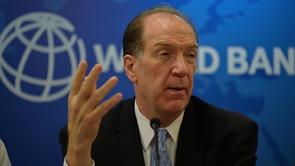 World Bank President David Malpass gestures as he speaks during a press conference at the World Bank office in New Delhi, India, on Oct 26, 2019. (SAJJAD HUSSAIN / AFP)
World Bank President David Malpass gestures as he speaks during a press conference at the World Bank office in New Delhi, India, on Oct 26, 2019. (SAJJAD HUSSAIN / AFP)
WASHINGTON - World Bank Group President David Malpass said Saturday that he is very pleased to see the progress the Group of 20 (G20) has made on debt transparency and debt relief.
"These are important, positive steps for development, and I've been glad to see constructive responses from major creditors," Malpass said during a G20 summit hosted by Saudi Arabia via videoconference during Nov 21-22.
Debt reduction and transparency will enable productive investment, a key to achieving an earlier, stronger and more lasting recovery.
David Malpass, President of World Bank Group
The G20 endorsed the Debt Service Suspension Initiative (DSSI) in April to help the poorest countries in response to the COVID-19 pandemic. The DSSI was extended in October by six more months.
ALSO READ: G20 leaders seek to help poorest nations in post-pandemic world
Last week, G20 finance ministers and central bank governors pledged to commit to the DSSI in close coordination, saying that maximum support would be provided for DSSI-eligible countries.
Chinese President Xi Jinping on Saturday said that the country supports a G20 decision on the extension of the DSSI, and will continue to fully implement it along with other parties.
"President Xi's commitments and last week's announcements are helpful and welcome," Malpass said at the virtual summit.
"Debt reduction and transparency will enable productive investment, a key to achieving an earlier, stronger and more lasting recovery," said the World Bank chief, adding that "more needs to be done."
READ MORE: Xi proposes pandemic 'firewall,' free trade for global recovery
Malpass noted that the debt challenges were becoming more frequent, including in Chad, Angola, Ethiopia and Zambia where, in the absence of more permanent debt relief, "the poverty outlook remains bleak".
"We need to guard against doing too little now, and then suffering disorderly defaults and repeated debt restructurings as in the 1980s," he said.


